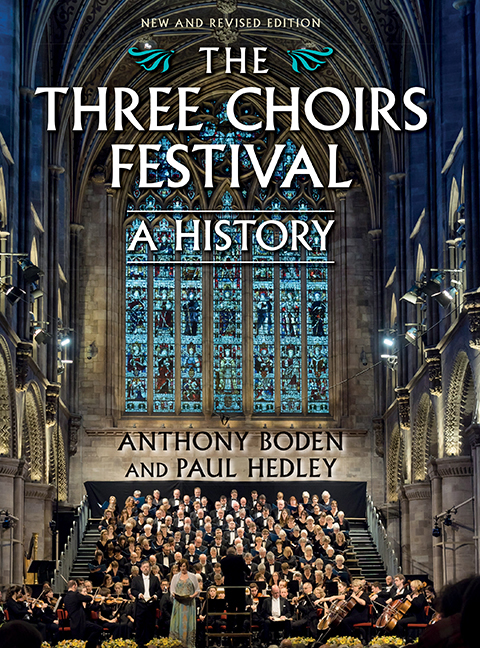Book contents
- Frontmatter
- Contents
- List of Illustrations
- Preface
- Acknowledgements
- List of Abbreviations
- List of Cathedral Organists
- 1 Origins
- 2 A Fortuitous and Friendly Proposal
- 3 A Numerous Appearance of Gentry
- 4 ‘The Musick of my Admiration Handel’
- 5 The Gentlemen and the Players
- 6 Avoiding Shipwreck
- 7 Prima voce
- 8 Favourites and Flops
- 9 Sacred and Profane
- 10 Froissart
- 11 The Unreasonable Man
- 12 The Dream
- 13 Beyond these Voices
- 14 An Essentially English Institution
- 15 The Elgar Festivals
- 16 Dona nobis pacem
- 17 Recovery
- 18 Association
- 19 A New Epoch
- 20 Jubilee
- 21 Theme with Variations
- 22 Houses of the Mind
- 23 ‘A Gold-Plated Orchestra’
- 24 A New Millennium
- 25 Reorganisation
- 26 An Invitation to the Palace
- Appendix Three Choirs Festival Timeline
- Select Bibliography
- Index
- Plate section
24 - A New Millennium
Published online by Cambridge University Press: 11 August 2017
- Frontmatter
- Contents
- List of Illustrations
- Preface
- Acknowledgements
- List of Abbreviations
- List of Cathedral Organists
- 1 Origins
- 2 A Fortuitous and Friendly Proposal
- 3 A Numerous Appearance of Gentry
- 4 ‘The Musick of my Admiration Handel’
- 5 The Gentlemen and the Players
- 6 Avoiding Shipwreck
- 7 Prima voce
- 8 Favourites and Flops
- 9 Sacred and Profane
- 10 Froissart
- 11 The Unreasonable Man
- 12 The Dream
- 13 Beyond these Voices
- 14 An Essentially English Institution
- 15 The Elgar Festivals
- 16 Dona nobis pacem
- 17 Recovery
- 18 Association
- 19 A New Epoch
- 20 Jubilee
- 21 Theme with Variations
- 22 Houses of the Mind
- 23 ‘A Gold-Plated Orchestra’
- 24 A New Millennium
- 25 Reorganisation
- 26 An Invitation to the Palace
- Appendix Three Choirs Festival Timeline
- Select Bibliography
- Index
- Plate section
Summary
AS the Festival passed over its third new-century boundary, it was becoming clear to some within the organisation that the model that had served it so well for so long was perhaps beginning to creak. For how long could the Festival remain as tripartite as it was, with its three local committees operating almost entirely autonomously under the delegated authority from the legal entity – the Three Choirs Festival Association? Granted, the Artistic Directors met from time to time, over a slap-up lunch in the Feathers in Ledbury, and the Association fulfilled its legal oversight functions in signing off both Festival programmes and budgets, but the music world was changing. Costs, both artistic and logistical, were rising, and the Festival was beginning to ask itself where the money was going to come from in the future, and indeed how best to manage itself. As annual budgets ticked past half a million pounds, with a little over half of that coming in as ticket revenue, key to the Festival's future was not only sponsorship, but also the prudent management of Festival resources.
The Festival Society held the organisation's reserves, which were not insubstantial, but which were very unevenly distributed, mainly down to substantial legacies given for the benefit of one or other city. Understandably, of course, local volunteer treasurers, who were taking on the direct management of very large sums, were defensive about ‘their’ money, and local committees tended to work in their own way, towards their own festival. This is not to say that the cities were hostile to each other, simply that their focus was continually on their own year, in their own milieu, with their own people. This is what had worked for many years, and arguably what made Three Choirs the entity that it was, with the clear individuality of each city and cathedral, and a particular identity recognised by audience and volunteer alike. However, there was a growing feeling that there could be potential benefits from more integration.
- Type
- Chapter
- Information
- The Three Choirs Festival: A HistoryNew and Revised Edition, pp. 357 - 388Publisher: Boydell & BrewerPrint publication year: 2017



